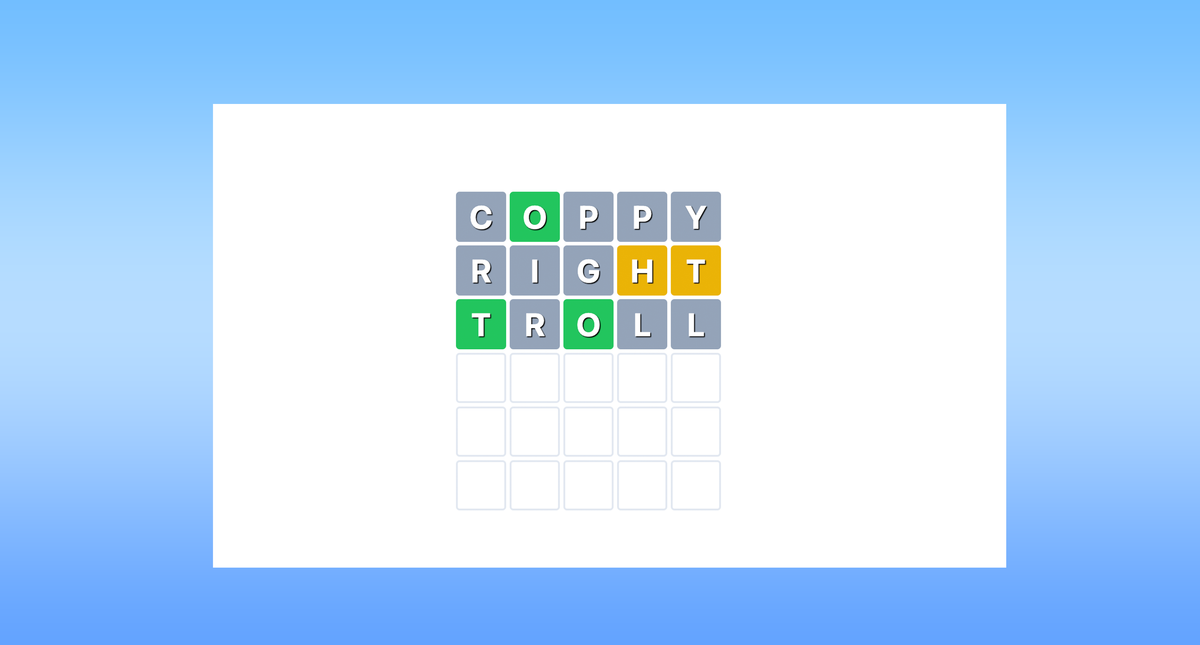- cross-posted to:
- games@lemmit.online
- cross-posted to:
- games@lemmit.online
New York Times really is hurting for money, huh?
I mean, in the USA you cannot copyright or trademark the broad gameplay mechanics theyre claiming to own (even specific gameplay mechanics like portals from Portal), nor would those be protectable under DMCA, so everything theyre trying to claim will be immediately tossed out of court.
Theyre literally trying to copy Nintendo. They dont want to go to court. They want settlement money.
Somebody pointed out in another post that wordle is the same thing as a game show from the 80s, including the five letter words and the square colors being highlighted based on being in the word or in the right place.
The New York Times is just bullying with nothing to stand on except the ability to spend more on lawyers than whoever they are suing.
It’s really just Mastermind with letters instead of colors. And they didn’t even create Wordle either, they bought it from the original creator and tried to lock it up behind a paywall. I still sometimes get told I have to subscribe to play. I’ve mostly given up on it because it’s lost it’s appeal for me anyway.
Fifty bucks a year is not bad considering you get thirty years worth of crosswords, too.
Except I can get crosswords elsewhere. I have two different apps on my phone that provide the same enjoyment. Maybe not up to the quality that people like from NYT but they do the job for me.
Is thirty years really all they have digitized? Jesus, that’s weaksauce.
Not just 80s, Lingo was a popular game show that aired in the 2000s and (from what I heard from a redditor a couple years back) still airs in some countries. Wordle is a rip-off of Lingo.
Under the name Motus, it aired in France without interruption from 1990 to 2019.
There were a few specific rule changes, after a while they started using 6- then 7- to 10-letter words (makes sense, since words tend to be longer in French and 5-letter words were a bit too limiting).
That’s interesting!
I remembered after commenting that Lingo is being revived and they also have some 6 and 10 letter words as well. Maybe they got that idea of Motus!
On the subject of game shows with adaptations that last a lot longer in other countries, Don’t Forget The Lyrics! still exists in France (“N’oubliez pas les paroles!”), is still quite popular and still airing every day on a major station. With occasional prime events, usually with champions or celebrities playing for charity.
If what I saw on wikipedia is correct, the original US show only lasted from 2007 to 2011.
Interestingly the formula of the French version has changed quite a bit from the original too.
https://en.m.wikipedia.org/wiki/Bulls_and_cows
That being said I do like the Wordly app cuz you can customize the length of the words, and some other tweaks.
I think they’re referencing Lingo! the gameshow from the 80’s.
I’m referencing an even earlier version that was so old it was on mainframes 😜
Somebody pointed out in another post that wordle is the same thing as a game show from the 80s,
But they said this… I don’t think Bulls and Cows was a game show.
If we’re just looking for the “earliest” game, then I think we’re looking for Jotto… Which was 50’s.
Game design isn’t copyrightable. Code is, they could have a case if someone literally copied the code (which is very easy given its all run in browser).
The New York Times has filed a series of copyright takedown requests against Wordle clones and variations in which it asserts not just ownership over the Wordle name but over the broad concepts and mechanics of the word game, which includes its “5x6 grid” and “green tiles to indicate correct guesses.”
It isn’ t about cofe.
The list of words in order also definitely is.
And a lot of them are trying to stay matched to the real one.
Meanwhile, NYT’s Connections is basically a direct rip of Only Connect’s connections wall round
Or they want to bully smaller devs who don’t have the resources to fight them to close down.
deleted by creator
I hate copyright and the notion of buying creative ownership. They didn’t make Wordle, they shouldnt have any control over it.
That implies that the creator should have control. And doesn’t control imply the right to sell?
But they don’t have control over the clones, copyright don’t extend that far
Assuming that Wordle is copyrightable at all, why wouldn’t copyright extend to clones? How far do you think copyright extend?
What would be the purpose of selling or buying the copyright if you can’t stop the ones that are “stealing” it for free?
Copyright covers creative expression, not functionality. The code and unique design elements would be protected, but not the idea of a grid or guessing letters, etc (which all predate them anyway). Even the word list is difficult to claim protection to if it was generated by algorithmic filters on dictionary words (it probably was) because then the selection also isn’t expressive.
So I can’t copy their code or exact look, but I can definitely make my own version legally.
What’s the point? Yeah I don’t know why they spent money on such a simple concept either. The copyright protection is far more useful when the thing has enough expression that clones won’t be indistinguishable anymore.
no, you no longer control it. now someone else does by virtue of money
no, you no longer control it. now someone else does by virtue of money
Yes the New York Times now controls it because they bought it with money from the owner/creator. That’s usually how purchases and money work.
Which is why we’re in this shitty timeline where every creative project is being handled by people that do not create. A lot of artists worked on a movie, but because soulless executives had all the money to own creative rights despite having no part in the movie’s creation, they just got rid of the movie to save on taxes. Creative ownership should never be decided by money.
Well the artists wouldn’t be able to be artists if no one could buy their content.
I don’t get why creative work should be treated like it’s more important than non creative works.
An artist that works for companies sell their time and effort to create stuff the company wants. A factory worker sell their time and effort to create stuff the company wants.
Yes it’s a shame some movies don’t get released but it’s not the end of the world.
Everyone involved still got paid and if someone is looking for anything more in their work they should start their own company.
selling your art and selling the right to create are different things. I sell my art all the time, and it gets copied and redistributed, and even more people come to me to buy more art.
They aren’t selling the right to create (whatever that means) when working on a movie though. They aren’t even selling the art.
It was never theirs to begin with.
They get paid to produce art and when they have done that their job is done. Nothing wrong with that. They sell their time and skill just like any other worker. It’s not like electricians own parts of your home after they have worked on it.
If they want to keep the rights they should specify that in their contracts and probably work freelance or something.
New York Crimes
TOOTH
Well, I know what my next project will be
Bruh
tooth
lol
deleted by creator
Don’t you touch my sedecordle!








